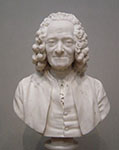Voltaire
|
 |
born Nov. 21, 1694, Paris, France
ied May 30, 1778, Paris
pseudonym of François-marie Arouet
One of the greatest 18th-century European authors, remembered as a crusader against tyranny and bigotry and noted for his wit, satire, and vigorous critical capacity.
Born of middle-class parents and educated by the Jesuits at the college of Louis-le-Grand in Paris, Voltaire studied law for a time but abandoned it to become a writer. He made his name with classical tragedies and continued to write for the theatre all his life. Voltaire's epic poem La Henriade was well-received, but his lampoons of the Regency and his liberal religious opinions caused offense. He was imprisoned in the Bastille for nearly a year (1717), and in 1726 he was driven into exile in England, where his philosophical interests deepened.
Following his return to France, in 1728 or 1729, Voltaire continued to write plays, and his histories—Charles XII (1731) and Le Siècle de Louis XIV (1751)—marked new departures for him and for historiography. After publication in 1734 of the Lettres philosophiques, in which he spoke out against established religious and political systems, Voltaire fled from Paris and settled at Cirey in Champagne with Madame du Châtelet, who became his patroness and mistress. At Cirey, Voltaire turned to scientific research. He also began to work systematically on the study of religions and culture.
In 1750, Voltaire accepted an invitation from Frederick II of Prussia to go to Berlin. In 1754 he purchased a house in Geneva and, four years later, settled at Ferney in France, near the Swiss border. He returned to Paris shortly before his death in 1778. In addition to his many works on philosophical and moral problems, Voltaire wrote several contes (“tales?), including Micromégas (1752), Zadig (1747), and Candide (1758), a satire on philosophical optimism that became his best-known work. He kept up an immense correspondence and took an interest in any cases of injustice—especially resulting from religious prejudice—that came to his notice.
Copyright © 1994-2002 Encyclopædia Britannica, Inc.
![]()
Sources
- Encylopedia Britannica 2002, Expanded Edition DVD
Web





